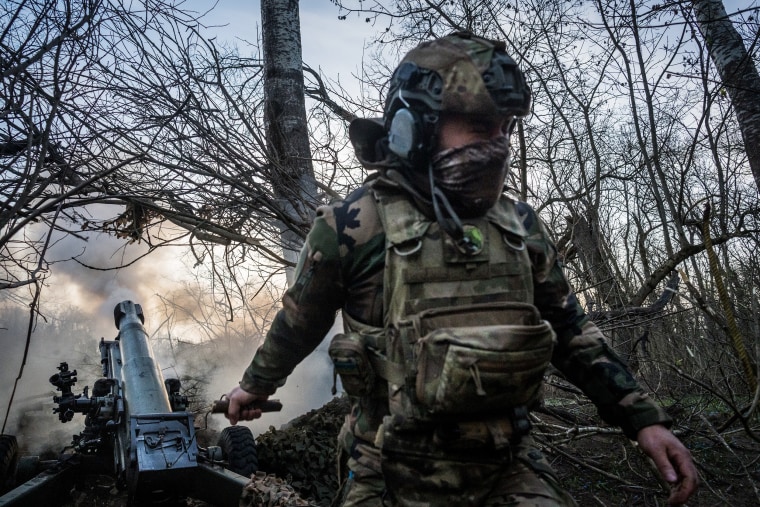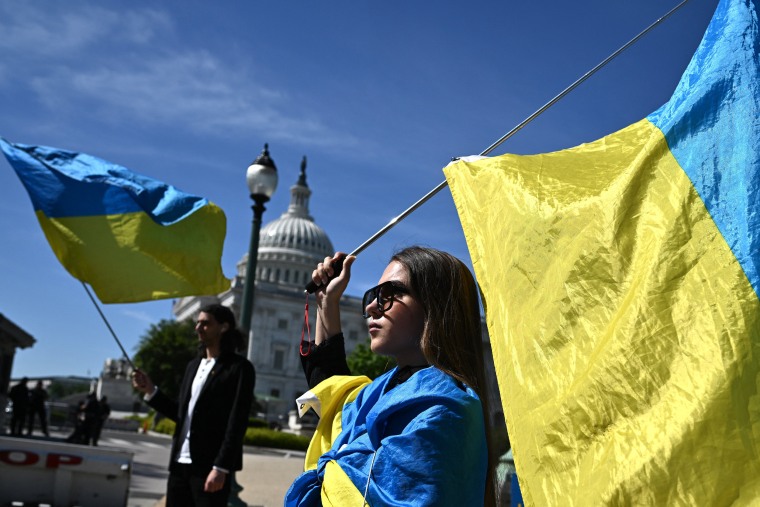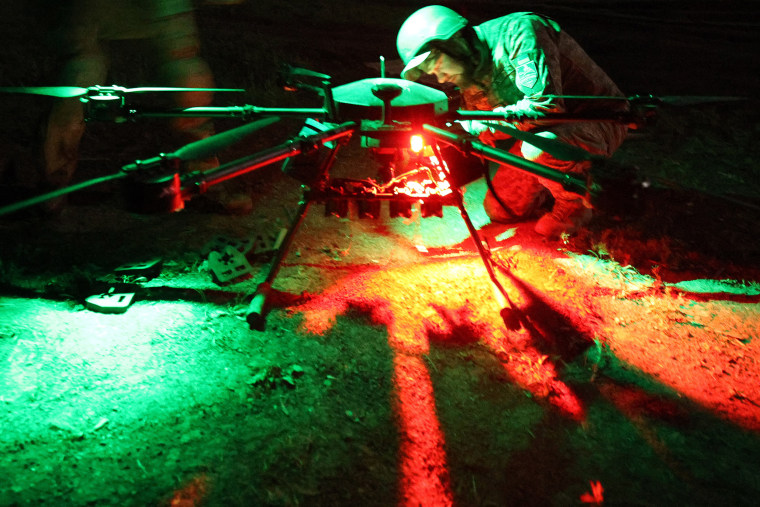KYIV, Ukraine — Ukraine needed this.
After months of political wrangling and battlefield reversals, Kyiv has reason to cheer. Now the race is on to ensure that U.S. military aid gets to the front lines in time to make a difference to troops trying to ward off the advancing Russian army.
For many in Ukraine, the news that the aid package had finally passed Congress offered relief and renewed hope of victory, with the war now in its third year.
But in the streets and trenches of Ukraine, those who spoke with NBC News espoused a view shared by many Western military analysts: that much damage had already been done and that, while important and welcome, the $60 billion of supplies would only go so far in resolving Ukraine’s problems.

The aid is coming at a “vital moment” for the U.S. ally, which faces severe ammunition and personnel shortages that have left it in a desperate situation on the front lines over the last few months, said Neil Melvin, the director of international security studies at the Royal United Services Institute, or RUSI, a London-based think tank.
“Russia is gradually grinding down Ukrainian men and weapons,” Melvin told NBC News. “The U.S. supplies can slow this process and potentially blunt an expected Russian counter-offensive over the summer, but Ukraine will need much more if it is to defeat Russia and reclaim its occupied territories.”
'The key now is speed'
President Joe Biden signed the bill into law just hours after it was passed by the Senate Tuesday night. "In the next few hours, literally a few hours, we’re gonna begin sending in equipment to Ukraine," Biden said Wednesday.
An initial package worth more than $1 billion is expected to include more equipment that the U.S. has already provided, including ammunition, High Mobility Artillery Rocket Systems or HIMARS, stingers, highly sought-after 155-mm artillery rounds, infantry fighting vehicles, Humvees, javelins and other military equipment, two U.S. officials familiar with the planning told NBC News.
"The key now is speed," Ukrainian president Volodymyr Zelenskyy said Wednesday. He said earlier that he had also finalized agreements on the supplies of long-range guided missiles called ATACMS, which Kyiv has long been seeking as part of its bid to strike deep behind Russian lines.
The news out of Washington has also been met with new promises from its European allies, with the U.K. announcing Tuesday its largest-ever military aid package for Ukraine.

The renewed support comes ahead of an expected Russian offensive, which Zelenskyy himself has said could happen as early as this summer. Moscow’s forces have already been pushing in several directions in recent weeks, raising the specter of a possible attack on Ukraine’s second-largest city, Kharkiv.
Russia’s defense ministry said its troops claimed two villages in the eastern Donetsk region in as many days this week, as the Kremlin looks to exploit beleaguered Ukrainian defenses and make as many gains as possible before the new aid arrives.
“If I were Gerasimov, I’d be pushing forwards as much as I could while there was a window of opportunity,” said Matthew Ford, associate professor in war studies at the Swedish Defence University in Stockholm, referring to Russian army chief Valery Gerasimov.
Bohdanivka, the village claimed by Russia on Sunday, lies just over 3 miles east of the town of Chasiv Yar, a heavily fortified base for the Ukrainian army. Ukraine’s top commander said last week that Russian forces were aiming to capture the town by May 9, a symbolic date when Russia celebrates the Soviet victory over Nazi Germany.
“Russia has the initiative on the battlefield. In the short term, that’s unlikely to be affected by the U.S. release of weapons to Ukraine,” Ford said. “Systems that help with air defense will help protect critical infrastructure. However, it is unlikely that land systems will challenge the current tempo of Russian activity as the summer fighting season starts.”
'Six months of shuffling'
In Ukraine, there was mixed opinion about the new aid and what difference it could make on the battlefield.
“As long as Ukraine is continuing its fight, nothing is too late,” Dmytro Pletenchuk, the spokesman for Ukraine’s southern military command, told NBC News, adding that the show of support after months of uncertainty and arguments would help boost the morale of troops and civilians behind the front lines, because they know “the civilized world is behind us.”
A Ukrainian drone pilot serving in the Kharkiv region also told NBC News that he welcomed the news, as drone units had been forced to cover for artillery units dealing with a severe shortage of shells. “We see this very positively,” said the soldier, who goes by the call-sign “Amida” and did not want his name used because he was not authorized to speak to the media.

He said he hoped the supplies would start reaching the front lines by the time of the anticipated Russian offensive this summer, because it would determine where Ukraine’s troops can stop them.
While grateful that a decision had finally been made in Congress, the soldier said the political infighting over the aid had left him with “an aftertaste” of disappointment. “The six months of shuffling, behind-the-scenes games, it was a sad sight,” he said.
Some civilians in Kyiv expressed similar concerns about when the aid would arrive and in what amounts, as well as lack of clarity among the Ukrainian public about how much the country will ultimately have to pay for the desperately needed help.
“It’s better than nothing,” said Georgiy Poliarush, 45. “War is a complicated thing in any case, but I think it will help. What will happen next and how much we will have to pay for it is a different question.”
The Kremlin has rejected the notion that the newly approved U.S. aid will make any difference on the front lines. "All these new arms supplies that are most probably ready to be dispatched will not change the dynamics at the war front," spokesman Dmitry Peskov said Wednesday.
But while Washington’s aid package may not immediately transform the battlefield situation, it is an important development that weakens Russia, said Christopher Tuck, an expert in conflict and security at King’s College London.
“We know that it won’t be transformational because Ukrainian forces were unable to achieve a decisive battlefield success last summer even though they had more aid than is being provided now,” Tuck said.
But the congressional vote to approve the aid demonstrates politically that the U.S. is still behind Ukraine, Tuck said, because Russian hopes of ending the war on more favorable terms are pinned on the belief that the tide has turned in its favor not just on the battlefield but in the halls of power, too.
“Replenishing Ukraine’s firepower is likely to increase Russian losses even further and this may help to slow, or halt, their advances,” he added. “This is important because, for any kind of peace settlement to emerge, Russia first has to believe that continuing to fight will not improve their bargaining position.”
Daryna Mayer reported from Kyiv, and Yuliya Talmazan from London.
